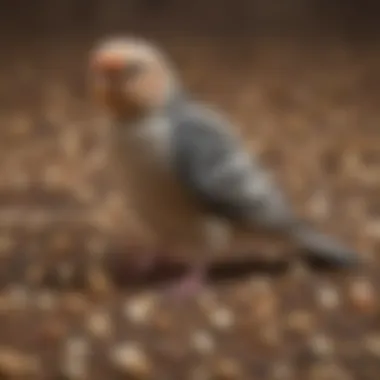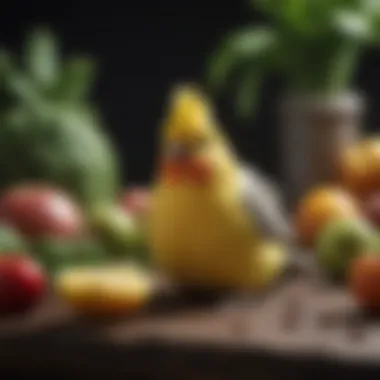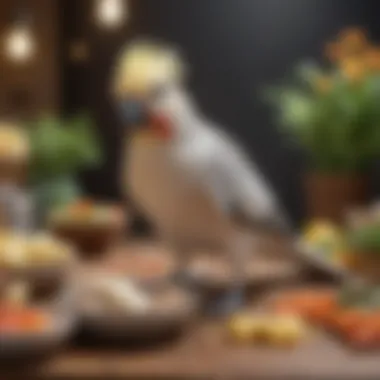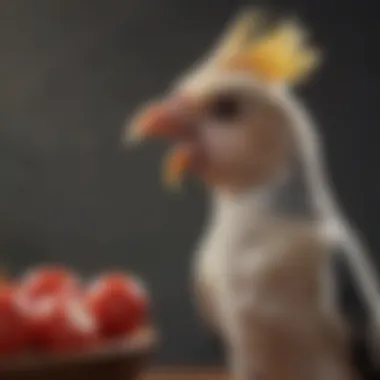Optimal Nutrition for Cockatiels: A Comprehensive Guide


Intro
Cockatiels are not just charming companions with their colorful feathers and playful personalities; they require a nuanced understanding of nutrition to thrive. Choosing the right diet for these birds goes a long way in ensuring they lead healthy and vibrant lives. The significance of optimal nutrition cannot be overstated, as it directly impacts their health, behavior, and longevity. Pet owners often make missteps when it comes to feeding their feathered friends, and that’s what this guide intends to address: a holistic approach to crafting the ideal diet for cockatiels.
This comprehensive guide will unearth the intricate layers of what constitutes a balanced diet for these delightful avians. From discussing the fundamental dietary components like seeds, pellets, fruits, and vegetables, to highlighting paramount feeding practices, we will walk through essential points. Whether you’re eyes-deep in avian literature or a first-time cockatiel owner, this will assist you in avoiding common dietary pitfalls.
"A well-fed cockatiel is a happy cockatiel. Understanding their needs lays the groundwork for a thriving pet."
The aim here is clear: enriching the lives of pet owners and their cockatiels through knowledge. So, buckle up as we delve into the world of optimal nutrition for your avian companion.
Prelude to Cockatiel Nutrition
Understanding what goes into the diet of cockatiels is crucial for their overall well-being. Cockatiels, beloved as companions for their vibrant personalities, require a carefully curated diet to thrive. This introductory section sets the stage for a deeper exploration of their nutritional landscape.
Understanding Cockatiels
Cockatiels are small to medium-sized parrots native to Australia. They are well-known for their charming trait of whistle mimicry and their social nature. These birds can easily captivate the hearts of families, animal lovers, and individuals alike. However, keeping a cockatiel in good health isn’t just about providing companionship; it’s also about ensuring they receive optimal nutrition tailored to their unique needs. Like all pets, cockatiels have specific dietary requirements that, when met, can enhance their vibrancy and lifespan.
Cockatiels are known to be picky eaters at times. Introducing a variety of foods can help ensure they have a nutritionally balanced diet. The subtleties of their preferences, their ability to be influenced by environmental factors, and their natural instincts all play a part in how they approach food. Promptly learning how to cater to their needs may go a long way in maintaining their good health.
The Importance of Proper Nutrition
Proper nutrition for cockatiels isn’t just about keeping their feathers shiny or encouraging them to sing. It’s about establishing a foundation for their overall health. A well-balanced diet not only boosts their immune system; it also enhances their mood and behavior. Poor nutrition can lead to various health issues, such as feather plucking, obesity, or even chronic conditions.
Cockatiel owners often express interest in understanding the type of food their pets prefer. By delving deep into the dietary preferences of cockatiels, we can identify which foods should make up their meals. High-quality pellets, fresh vegetables, fruits, and occasional seeds form the cornerstone of a suitable diet. However, the importance of education cannot be overstated. Misconceptions regarding cockatiel diets can lead to unintended consequences, such as overfeeding certain items or neglecting essential food types.
“An informed owner contributes to a happier and healthier cockatiel.”
When it comes to feeding our feathered friends, knowing the ins and outs of nutrition is paramount. The forthcoming sections will delve into the essential dietary components, feeding practices, and strategies to tailor their diet according to their unique needs—offering a comprehensive roadmap to ensure that these delightful birds lead long, healthy lives.
Essential Dietary Components
Understanding the essential dietary components for cockatiels is key to ensuring their overall health and vitality. These charming birds require a well-rounded diet that provides all the necessary nutrients to thrive. A balanced diet not only supports their physical health but also enhances their mood and behavior. Just like humans, cockatiels can experience various health issues if their dietary needs aren't met. A solid nutritional understanding equips pet owners to make informed decisions that positively affect their feathered companions.
Seeds: A Traditional Staple
Seeds have long been a staple in many bird diets, and for good reason. They offer a variety of essential fats and proteins. However, not all seeds are created equal when it comes to the dietary needs of cockatiels.
Types of seeds suitable for cockatiels
When selecting seeds for cockatiels, a diverse mixture is vital. Common choices include millet, sunflower, and safflower seeds. Each type has its own benefits: millet provides carbs and fiber, sunflower seeds are rich in fat for energy, while safflower seeds offer less fat but still pack a nutritional punch.
These seeds not only contribute to a tasty treat but also support natural foraging behaviors. Birds often enjoy the process of searching and extracting seeds from their shells, making the feeding experience more enriching. This
Potential drawbacks of seed diets
However, relying solely on seeds can lead to health issues. Seeds are often high in fat and can cause obesity in cockatiels when they do not have exercise. A seed-only diet may lack essential vitamins and minerals, which could lead to deficiencies. Unlike a well-rounded diet, seeds can't provide the full spectrum of nutrients needed for healthy feathers, strong bones, and proper organ function. The bottom line is that while seeds can be delightful, moderation is key.


Pellets: A Balanced Alternative
For many bird owners, pellets are a go-to choice that offers a more balanced and complete diet for cockatiels. Formulated to include all necessary nutrients, pellets eliminate the guesswork.
Why choose pellets over seeds
Choosing pellets over seeds often results in better health outcomes. Many brands create pellets specifically designed for cockatiels, which contain proper ratios of vitamins, minerals, and other nutrients. This crafted balance reduces the risk of malnutrition since every bite delivers essential sustenance. They also help maintain a healthy weight by providing controlled amounts of calories.
Recommended pellet brands
When picking pellets, not all are made the same. Well-known brands such as Kaytee’s Exact, Lafeber's Premium Daily Diet, and Harrisons' High Potency are recognized for their high-quality formulations. These brands emphasize proper nutritional balance while ensuring that the pellets are palatable for our feathered friends. However, it is important to read ingredients since some might contain fillers that do not benefit your cockatiel's health.
Fruits: Nutrient-Rich Treats
Fruits can offer cockatiels a delightful and enriching addition to their diet. They not only provide hydration but also vital vitamins.
Best fruits for cockatiels
Cockatiels generally love fruits like apples, bananas, and berries. Apples, in addition to being tasty, provide fiber and Vitamin C. Bananas are high in potassium, while berries offer a range of antioxidants. Remember to wash all fruits thoroughly before serving, and remove seeds from fruits like apples to ensure safe consumption.
Incorporating fruits into their diet
Integrating fruits into a cockatiel’s daily diet can be as easy as cutting them into bite-sized pieces and placing them alongside seeds or pellets. Foraging toys can add extra fun, making the fruit a rewarding challenge. It's important to offer fruits in moderation, as excessive sugar can lead to health dilemmas.
Vegetables: Essential for Health
Vegetables are indispensable for a balanced diet, offering a wealth of nutrients that seeds and pellets may not provide.
List of safe vegetables
Brightly colored veggies such as spinach, carrots, and bell peppers are not only visually appealing but are also rich in nutrients. Dark leafy greens, for instance, offer calcium and iron. Other good choices include broccoli, zucchini, and sweet potatoes.
Preparing vegetables for consumption
Preparing vegetables for cockatiels can be a simple process. Wash them thoroughly, chop into manageable pieces, and serve raw or lightly steamed. It’s a good practice to rotate the offerings to introduce new tastes and textures regularly, keeping meals from becoming monotonous.
Nuts and Grains: Occasional Additions
While not a primary dietary staple, nuts and grains can be wonderful treats for cockatiels when offered lightly.
Types of nuts suitable for cockatiels
Almonds, walnuts, and pecans are generally safe nuts for cockatiels in moderation. They contain healthy fats that provide energy but should be treated as a snack rather than a meal component due to their high-calorie content.
How to incorporate grains
With grains like cooked rice or oats, moderation is the name of the game. Mixing small quantities into their daily feed allows for an interesting texture and consistent nutrition without overwhelming their diet.
Supplements: Ensuring Nutritional Balance


Supplements can play a pivotal role in filling nutritional gaps and ensuring a well-rounded diet.
Types of supplements available
Calcium and vitamin D3 supplements are essential, as cockatiels may not always get enough through their diet, especially if they don't receive direct sunlight. There are also complete supplement formulas available in popular brands to give extra support, especially during times when you suspect a deficiency.
Assessing when supplements are necessary
Assessing the need for supplements often depends on a cockatiel's individual health needs. If you notice changes in behavior, feathers looking lackluster, or less energy, it might be a signal that their diet isn't hitting the mark. Always consult with an avian veterinarian before adding any supplements to ensure they are appropriate and necessary.
Feeding Practices for Cockatiels
Feeding practices play a crucial role in ensuring the health and vitality of cockatiels. These birds thrive on a well-balanced diet, and how they are fed can significantly influence their overall well-being. Effective feeding practices encompass not just the types of food provided, but also the timing and methods of delivery. Establishing consistent routines and ensuring proper dish placement can mitigate health risks and improve nutritional intake.
Creating a Feeding Schedule
Optimal times for feeding
Establishing optimal feeding times is vital for your cockatiel’s health. Birds are creatures of habit. They feel secure when their daily routine is stable. Typically, feeding in the morning aligns with their natural foraging behavior, as birds seek out food early in the day. By providing fresh meals at this time, you also ensure they start their day with energy, supporting their activity and engagement.
Another important aspect is evening feedings. These hours can serve as a final opportunity for your cockatiel to replenish before a long night of rest. However, it is wise to avoid feeding immediately before bedtime. Leftover food can lead to spoilage and attract unwanted pests in the cage. Finding the sweet spot between meal times can help maintain a healthy digestive rhythm in your feathered friend.
Portion control
Portion control holds equal weight in establishing a sound feeding routine. Offering just the right amount is a balancing act between their appetite and their ability to consume food without waste. Here lies the beauty of understanding your bird's needs—too much food can lead to obesity, while too little can result in malnutrition.
A unique feature of portion control involves observing eating behaviors. If your cockatiel tends to nibble and leave food, adjusting portions becomes key. Start with smaller portions and assess how much they consume in a sitting. This practice not only promotes health but also encourages foraging, which stimulates natural instincts.
Proper Dish Placement
Choosing the right feeding bowls
The choice of feeding bowls can significantly affect feeding habits. Opting for sturdy, non-toxic material ensures safety during mealtime. With cockatiels, shallow dishes are often the best choice. These allow easy access to food without causing stress. Additionally, bowls should be spaced out within the cage to promote movement and exploration, which is essential for physical health.
A unique feature worth noting is the use of different bowls for various food types. Designating specific bowls for seeds, pellets, fruits, or veggies can create a more organized and visually appealing dining experience. This differentiation also helps you identify what your cockatiel enjoys the most, allowing for adjustments in their diet.
Safety in feeding practices
Safety during feeding is a primary concern. Ensuring that all food types are free of contaminants is essential for preventing any health issues. Regularly check your cockatiel’s dishes for cleanliness, as sanitation can significantly affect their health. Moreover, consider bowl placement within the cage. Ensuring that food dishes are out of reach of any potential hazards—like sharp cage edges or swing sets—helps prevent injury.
Another aspect of safety involves monitoring your bird's response to various foods. Each cockatiel is unique, and what works for one may not work for another. Keep an eye for any signs of discomfort or allergies after introducing new foods. Having a responsible feeding routine not only enhances their diet but also safeguards their health.
Common Mistakes in Cockatiel Diets
Maintaining an optimal diet for cockatiels is crucial, yet many pet owners inadvertently fall into common traps. Understanding these pitfalls is not just about avoiding bad habits; it's about ensuring the well-being and longevity of these beloved birds. Addressing nutrition mistakes can transform a cockatiel's life, allowing it to thrive and enjoy good health.
Overreliance on Seeds
Cockatiels have hearts that flutter at the sight of seeds, and it's easy for owners to make seed the main course. Seeds, especially sunflower and safflower types, can be tasty treats for our feathered friends, but they should not dominate their diet. While seeds do provide certain nutrients, they are often high in fat and low in other essential vitamins and minerals.


This favoritism can lead to several health complications like obesity, feather plucking, and even shortened lifespans. Think of it this way: overindulgence in seeds can leave cockatiels missing out on the balanced diet they need to shine. To strike a healthy balance, owners should remember the mantra: "Variety is the spice of life." Incorporating a mix of pellets, veggies, and fruits ensures birds get a well-rounded nutritional profile that keeps them bouncing about their cages with vigor.
Neglecting Fresh Produce
In the hustle and bustle of daily life, fresh fruits and vegetables can easily get pushed to second place. However, neglecting fresh produce is like inviting trouble to dinner. Fresh fruits and veggies are rich in vitamins and hydration, which are vital for a cockatiel's immune system and overall vitality.
For instance, carrots, broccoli, and bell peppers can be a delightful addition to your bird’s bowl—more colorful than a painter’s palette. But, some owners are wary of change. If you notice your cockatiel turning its beak up at new items, don’t give up too easily!
Gradually introducing these foods can entice them, and it’s crucial to note which produce they prefer. In the end, fresh additions can bring a boost to their energy levels and overall health—a simple yet powerful step for improving their diet.
Ignoring Water Quality
Water is the unsung hero of diets, frequently overlooked. Just as humans need clean water to function, cockatiels require pristine water for optimal health. When owners forget to change their birds' water regularly or fail to clean the water dish thoroughly, it can lead to illness caused by bacteria or toxins.
Imagine a scenario where your cockatiel refuses to drink from a dirty bowl. Birds are picky about their water and might become dehydrated if the quality is subpar. To ensure hydration is never a concern, keep an eye on their water and refresh it daily. Providing filtered or bottled water can also promote better health, especially if tap water in your area is not great.
Fresh, clean water is as essential for cockatiels as sunshine is for flowering plants.
By avoiding the common mistakes of overreliance on seeds, neglecting fresh produce, and ignoring water quality, owners can pave the way for a happy, healthy cockatiel. In the end, a little diligence goes a long way in strengthening the bond between pet and owner while enhancing the bird’s quality of life.
Tailoring Diets for Individual Needs
When it comes to cockatiels, there's no one-size-fits-all when it comes to their diet. Each bird is unique, and their nutritional needs can vary based on several factors. Tailoring diets for individual needs is not just important; it’s essential for ensuring your feathered friend lives a long and vibrant life. By understanding the specific requirements of your cockatiel, you can make informed decisions that will enhance their health, happiness, and overall well-being.
Age Considerations
Age is a significant factor in determining the right diet for your cockatiel. Young cockatiels have different nutritional needs compared to older ones. For example, babies and juveniles require high levels of protein and calcium to support their rapid growth and development. When they reach maturity, around 6 to 12 months old, their diet should shift to balance these needs with lower protein levels, emphasizing fiber and essential vitamins.
In contrast to the younger generation, senior cockatiels often face health issues that demand special consideration in their diet. This might mean more easily digestible foods and a focus on specific nutrients to support aging joints and promote heart health. Incorporating softer foods or enhancing their fruits and vegetables' nutritional value can make a world of difference.
It’s wise to frequently revisit your cockatiel’s needs as they age. What works at one stage might not be as beneficial years down the line. Noticing changes in behavior, weight, or feather condition can indicate when it might be time to adjust their diet. Therefore, consistency in monitoring your pet’s needs due to age is vital for maintaining their health.
Health Conditions Impacting Diet
Just like humans, cockatiels can face various health challenges that significantly influence their dietary needs. From allergies to hormonal imbalances, each condition has the potential to necessitate a change in what and how much they eat.
For example, a cockatiel with liver disease may need a diet low in protein and fat, focusing instead on leafy green vegetables and specific, vet-recommended pellets. Contrarily, a bird that has been diagnosed with kidney issues might benefit from a diet adjusted in sodium intake and increased hydration through fresh fruits and vegetables.
It’s crucial to consult with a veterinarian if you suspect your cockatiel has any health issues that could affect its diet. Regular health checkups are just as important. They can guide you in customizing a diet that aligns with your cockatiel's specific health requirements.
Offering a tailored diet isn’t just about avoiding harmful foods; it’s often about enriching your bird's life. Nutrient-dense foods can aid in the healing process, improving their quality of life. Thus, keeping an open line of communication with your veterinarian can help you stay informed and proactive in creating the best possible environment for your cockatiel's health.
A tailored diet can significantly impact your cockatiel’s happiness and lifespan, making individual assessments crucial for pet owners.
Epilogue: The Path to Optimal Cockatiel Health
As we wrap up this exploration into the world of cockatiel nutrition, it's essential to recognize the significant impact that proper dietary choices can have on these beloved pets. A well-balanced diet, tailored to the specific needs of your cockatiel, is not just a matter of convenience; it's crucial for their overall health, longevity, and well-being.
Cockatiels, with their vibrant personalities and playful natures, rely heavily on their owners to provide optimal nutritional support. This diet should encompass a variety of foods, including a balanced mix of seeds, pellets, fresh fruits, and vegetables, ensuring that every mealtime is a step toward a healthier life. Here are a few key considerations to bear in mind as you forge this path to enhanced cockatiel health:
- Diversity in Food Choices: Just as we enjoy varied foods for our own health, cockatiels thrive on a diverse diet. Incorporating different sources of nutrition will help prevent boredom and encourage foraging behavior.
- Watch for Individual Needs: Each cockatiel is a unique individual with specific dietary needs. Factors such as age, health status, and activity level must be taken into account. A younger bird may require more protein than an older one, while a bird with a health condition may need specialized foods or supplements.
- Monitor Water Quality: Clean drinking water is essential for cockatiels. It's easy to overlook, but stale or contaminated water can lead to health issues. Regularly change their water and clean dishes to ensure they are always hydrated and healthy.
- Educate Yourself: The realm of pet nutrition is continually evolving. Stay informed about the latest research and dietary recommendations. Resources such as articles from Britannica or citations from the Wikipedia page on cockatiels can offer valuable insights.
"An ounce of prevention is worth a pound of cure."
By investing time in understanding and caring for your cockatiel’s nutritional needs, you’re making a lasting impact that will manifest in their health and happiness.





